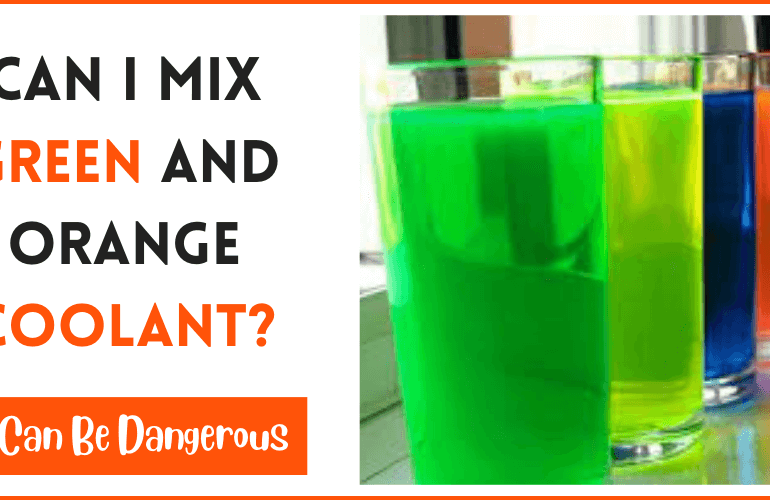

Do you find yourself staring at rows upon rows of oil at an auto parts store, wondering if you can squeeze extra miles out of a mix-and-match routine? Mixing motor oils might be a tempting shortcut, especially when you’ve got half-empty bottles of varying viscosities lying around the garage. But there’s more to it than just a quick blend. If you’ve questioned, “Can I mix 5w-20 and 0w-20 oils,” you’re not alone. This common automotive dilemma has been the subject of much debate, often accompanied by an overload of misinformation.
Can I Mix 5W-20 And 0W-20?
No, it’s generally not recommended to mix different oil viscosities, combining 5w-20 and 0w-20 is usually acceptable in emergencies. However, for optimal performance, it’s best to stick to the manufacturer’s recommended oil grade.
The “5w” and “0w” in motor oil grades refer to the oil’s viscosity, thickness, and flow characteristics at various temperatures. The lower the number, the thinner the oil and the better its cold-start performance. Discuss whether can i mix 5w-20 and 0w-20. The “w” stands for “winter,” which implies that the oil has been tested and certified for performance at low temperatures. The other number (in this case, 20) represents the oil’s high-temperature viscosity or its resistance to thinning at high temperatures.
Factors To Consider
Before you start mixing oils, several key factors must be considered:
- Engine Type and Age
Newer engines often come with tighter tolerances, and the manufacturers prescribe specific oils to work within those tolerances. Mixing different oils can affect the engineered clearances and potentially lead to excess wear. - Manufacturer Recommendations
The most straightforward answer to the mixing question often lies in your vehicle’s owner’s manual. Manufacturers spend significant amounts on research and testing to determine the best oil for an engine. - Climate Conditions
If you live in a region with extreme weather, the choice between 5w-20 and 0w-20 becomes more critical. Cold weather can thicken oil, making it harder for the engine to turn over. Hot weather can thin oil, reducing its protective capabilities.
Common Misconceptions
Many car owners believe mixing oils is a great way to “compromise” in mild climates where the choice is less critical. However, this notion is not always accurate. There’s a common misconception that engine oil breaks down over time only, and as long as you’re keeping it topped up, you’re doing good.
The truth is, that engine oil composition changes due to heat and pressure. Mixing oils with different chemical formulations can result in less effective lubrication and potential long-term engine damage.
Expert Opinions And Industry Recommendations
Industry professionals and automotive experts are generally in agreement: it’s best to stick with one viscosity unless otherwise recommended by the manufacturer or if the oil you’ve got falls within a particular standard, like API or ILSAC. Consistently using the manufacturer-recommended viscosity will ensure your engine receives the designed-for level of protection.
Practical Tips
If you’ve already mixed oils and are worried about the consequences, don’t panic. It’s not an immediate death sentence for your engine. However, taking these practical steps can help mitigate any risks:
- Monitor Your Oil Levels: Keep a close eye on your oil levels. If you notice any substantial or sudden changes, it could be a sign of oil breakdown or incompatibility.
- Consider an Oil Change: If you find yourself in a situation where you need to top off your oil and you don’t have the exact grade recommended by your manufacturer, adding a slight amount of a different oil is better than running low or dry.
Personal Experiment
In my own experience, I’ve experimented with different oil grades in an older vehicle with looser tolerances. After running a 5w-20/0w-20 mix, I noticed no immediate issues, but I did feel a bit more valve train noise, indicating potential for excess wear. After an oil change, the engine reverted to its typical hum. From this personal experiment, while nothing catastrophic occurred immediately, it reinforced the importance of using the proper oil within a vehicle’s specified range to maintain longevity.
Related Guides:
Can I Use A 5w20 Instead Of A 0w20 Honda Civic?


For many models of the Honda Civic, the manufacturer recommends the use of 0W-20. This oil grade provides optimal fuel efficiency, as well as excellent cold-weather and high-temperature performance. However, under certain circumstances, you could use 5W-20 without a significant risk of damage. Still, this could potentially lead to a minor decrease in fuel efficiency and cold-weather performance.
It’s important to remember that consistent use of the manufacturer-recommended oil grade is key to maintaining engine performance, and longevity, and preserving the vehicle’s warranty. Always consult your automotive technician or dealer before making a change.
Can I Use A 5w20 Instead Of A 0w20 Toyota Camry?


When considering whether to use 5W-20 instead of 0W-20 in your Toyota Camry, the primary reference should always be the vehicle’s owner’s manual. Most modern Toyota Camry models recommend 0W-20 oil grade due to its superior fuel efficiency and cold-weather performance. However, in certain circumstances, using 5W-20 may not pose a significant risk to the engine.
Still, it might lead to slight reductions in fuel efficiency and cold-weather performance. Consistent use of the manufacturer-recommended oil grade is of paramount importance for optimal engine performance, longevity, and the preservation of your vehicle’s warranty. Prior to making any changes, it’s highly recommended to consult with a certified automotive technician or your Toyota dealer.
Is 0w-20 Good For Hot Weather?
0w-20 is not ideal for continuous use in consistently hot climates, as it is engineered for improved cold-start protection. If you live in a hotter area, it’s wise to follow manufacturer guidelines for the recommended viscosity or to discuss alternatives with an automotive professional.
Conclusion:
In the world of motor oils, precision is key. While it might seem convenient to mix oils to save time or money, the potential long-term risks far outweigh the immediate benefits. Discover what can i mix 5w-20 and 0w-20. To protect your engine and ensure its optimal performance, always refer to your owner’s manual and use the manufacturer-recommended oil grade.
If you find yourself unable to procure the suggested oil type, consult an automotive professional to discuss your options and ensure the health of your engine. Remember, regular oil changes using the correct grade are one of the most important maintenance tasks to keep your vehicle running smoothly.
References:
- By tiredguy, 0W20 or 5W20 ok to mix? Posted on Apr 15, 2022.
- By Davina Smith, Is it okay to add 0W-20 to your car if there’s 5w20 in it? Posted 4 years ago.
- By u/reallyscaredtoask, if my engine takes both 0w20 and 5w20, can I mix them? or should I do a full oil change before switching over to the other? Posted 8 months ago.



